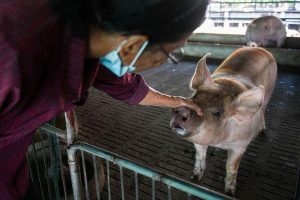AI seen improving ASF vaccine development
ARTIFICIAL INTELLIGENCE (AI) is helping improve the development of vaccines for livestock diseases like the African Swine Fever (ASF), a professor from the University of the Philippines Los Baños (UPLB) said. “Through machine learning, we can bolster our ability to study the discovery, evolution, and diversity of viruses,” Homer Pantua, a professor with the UPLB […]

ARTIFICIAL INTELLIGENCE (AI) is helping improve the development of vaccines for livestock diseases like the African Swine Fever (ASF), a professor from the University of the Philippines Los Baños (UPLB) said.
“Through machine learning, we can bolster our ability to study the discovery, evolution, and diversity of viruses,” Homer Pantua, a professor with the UPLB Institute of Biological Sciences, said in a forum on Thursday.
A recent resurgence of ASF cases around the country prompted the government to fast track its vaccine procurement and rollout to hog farmers.
The Department of Agriculture (DA) allocated P350 million to procure 600,000 doses for hog farmers. The limited rollout started in Batangas on Aug. 30.
However, farmers have said onerous eligibility requirements are delaying their participation in the vaccination program.
Mr. Pantua said researchers need to optimize sample collection and data documentation to produce better data in addressing animal diseases.
“We propose that machine learning guided applications can help support vaccine research and also help in making careful analyses of the virus origin and evolution,” he added.
He cited research findings indicating that ASF strains in the Philippines have evolved “either temporally or geographically.”
He added that better data input could allow scientists to “rapidly and objectively identify good vaccine candidates.”
So far, only the AVAC ASF Live vaccine from Vietnam has been approved by the Food and Drug Administration for a government-controlled rollout.
Last week, the DA allowed commercial hog farms to participate in the vaccination program amid delays in inoculation.
As of Oct. 18, 108 municipalities across 25 provinces had active ASF cases, according to the Bureau of Animal Industry. — Adrian H. Halili
















